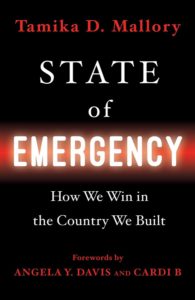Book Review: State of Emergency
 Tamika Mallory is a rising star within many social justice movements in America. She first came to prominence as a co-chair of the 2017 Women’s March with her firebrand outspokenness. More recently, she has been one of the faces of the 2020 protests when she said in a now-famous speech that George Floyd’s death wasn’t an isolated incident but really a bookmark in a long history of systemic racism. In her debut book, State of Emergency: How We Win In The Country We Built, Mallory guides readers through America’s racial history to explain why the country is indeed in a state of emergency and what can be done about it.
Tamika Mallory is a rising star within many social justice movements in America. She first came to prominence as a co-chair of the 2017 Women’s March with her firebrand outspokenness. More recently, she has been one of the faces of the 2020 protests when she said in a now-famous speech that George Floyd’s death wasn’t an isolated incident but really a bookmark in a long history of systemic racism. In her debut book, State of Emergency: How We Win In The Country We Built, Mallory guides readers through America’s racial history to explain why the country is indeed in a state of emergency and what can be done about it.
This is great for readers who might not be knowledgeable about social justice issues or don’t consider themselves activists but were radicalized by Floyd’s death and the ensuring uprisings worldwide. Rapper Cardi B asks in one of the two forwards in this book if an entertainer like herself who isn’t involved in politics has a role in the movement. Legendary activist Angela Davis answers in the other forward that entertainers have also had a role in social movements like Nina Simone and Harry Belafonte. As a matter of fact, Davis said Simone’s musicianship inspired her, and the late singer also visited Davis in jail back in the 1970s. Simone didn’t think she was educated enough to be an activist, even though today she is remembered as one of the leading voices from the civil rights movement. Davis said art moves people, and activists come into movements from different perspectives and lived experiences.
Mallory begins the book by talking about how her upbringing in Harlem, her activist parents’ involvement with Rev. Al Sharpton’s National Action Network (NAN), and her son’s father’s death inspired her activism. She then goes briefly into historical touchstones like slavery and Jim Crow laws, as well as more recent subjects like the war on drugs, the crime bill, welfare reform, and the Trump administration has led to a situation where people are protesting in the streets against police brutality and tearing down Confederate monuments and other public racist symbolism.
Mallory explains some practical issues that activists should know, like the difference between centralized and decentralized organizing, why you should pack light, and even why you should always have identification on you when you go out to a protest. I really appreciate her saying why voting is important. Often, people go to protests and don’t think to take the next step of learning more about the issues affecting their communities and voting. And not just voting, but also voting down-ballot in local elections. Mallory also takes down white women for being co-conspirators in racism and how “Karenism” has held back and destroyed black communities.
Speaking of white ladies, the only blindspot to this book was Mallory’s perspective, kind of, about her time in the Women’s March. Mallory was criticized for her association with Min. Louis Farrakhan, who has been accused of making antisemitic and homophobic at a 2018 Saviour’s Day event. Mallory was also accused of making antisemitic remarks to Vanessa Wruble, a Women’s March co-founder who is also Jewish. Wruble claims she left the organization because of concerns about antisemitism within the organization. Mallory disputed that she made the remarks to Wruble.
Although Mallory went on TV at the time to say she didn’t agree with Farrakhan on everything but didn’t directly condemn antisemitism, I think it was a missed opportunity for her to use the book to give her side of the story some clarity in her own words. Instead, she has another Women’s March co-chair and “accomplice” (Mallory’s words!) Linda Sarsour explain what really happened in a separate essay in the book. According to Sarsour, the organization, mostly led by white women, either didn’t understand or want to understand marginalized women’s issues and include their issues in the march’s platform. Every time Mallory tried to bring up these issues, she was shut down as an angry black woman. When Mallory started to gain traction in calling out privileged white women, the hate mail and death threats started to come in from detractors, who also began a smear campaign by using video of Mallory attending the Saviour’s Day event. It just seemed weird to me that Mallory used someone else’s words to describe an issue that directly happened to her.
But this is a minor issue in the book. Mallory concludes with some potential solutions to help move the country forward, like reparations and criminal justice reform. This book is definitely worth a read if you are a beginner activist looking for a roadmap.
State of Emergency: How We Win in the Country We Built by Tamika Mallory. Published by Black Privilege Publishing on May 11, 2021. Buy the book here.